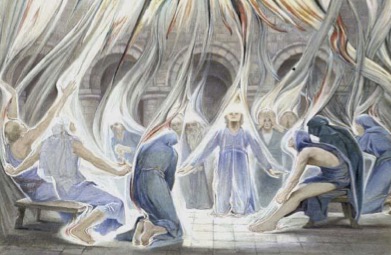Jer 23:1-6
Psalm 23:1-3, 3-4, 5, 6
Eph 2:13-18
Mark 6:30-34
 I dread election years. I dread the soundbites that distort a politician’s message. I dread the pandering of politicians to powerful special interest groups, leading them to neglect the interests of the nation as a whole. But most of all I dread the back-biting and bickering, the wild accusations against “my opponent,” and the way in which our political process is, in general, so deeply divisive.
I dread election years. I dread the soundbites that distort a politician’s message. I dread the pandering of politicians to powerful special interest groups, leading them to neglect the interests of the nation as a whole. But most of all I dread the back-biting and bickering, the wild accusations against “my opponent,” and the way in which our political process is, in general, so deeply divisive.
Though the presidential election is over a year away, it already feels as if it is heavy upon us. And it was towards the idea of political leadership (and its failures) that my mind turned as I thought about our readings for this Sunday.
Our first reading is a strong prophetic denunciation of the leaders (shepherds) “who mislead and scatter the flock.” It is key that one of the characteristics of the bad shepherds is that they create disunity. God’s promise is to bring unity out of disunity. Speaking through the prophet, the Lord says,
I myself will gather the remnant of my flock
from all the lands to which I have driven them
and bring them back to their meadow;
there they shall increase and multiply.
I will appoint shepherds for them who will shepherd them
so that they need no longer fear and tremble;
and none shall be missing, says the LORD.
In our second reading, we see the author of Ephesians emphasizing the way in which Jesus has brought unity between Jews and Gentiles: “For he is our peace, he who made both one and broke down the dividing wall of enmity through his flesh . . . and might reconcile both with God.”
Finally, in our Gospel, we have Jesus moved with pity when he sees the crowd “for they were like sheep without a shepherd.” Jesus begins to teach them and thus creates order and unity in his scattered little flock.
Jesus’ little flock today still suffers from fragmentation and disorder. It is a flock that has been scattered, often due to the influence of politics. This is especially true in the Catholic church which is often split in this country along political lines. Election years tend to bring out the worst in us as “liberal” Catholics and “conservative” Catholics spar over who is actually a “good” Catholic. As we prepare for another election cycle, we can glean some lessons from this week’s readings so that further disunity is not brought into the Church.
1. The importance of the desert: In our gospel, as the crowds press in on Jesus, he goes off to a deserted place to rest a while. This is a theme in Mark, and an important one for us remember today. For us, the “crowds” might refer to the sheer volume of information and opinion that we are inundated with. I am not on Facebook, but my friends often complain about how hostile and vitriolic their Facebook time becomes. As we contemplate Jesus going off to a deserted place, we might follow by taking on periodic abstinence from Facebook and other social media.
2. The importance of the cross: In our second reading, the author writes that Jesus established peace and unity through the cross. This might be a reminder of the ways in which we may have to “die to self” in order to foster unity. Prudence demands that we learn to discern which battles are worthwhile, and when we need to silence our own voice and opinions for the sake of the other. The cross also reminds us of the importance of service to the other, even in spite of our difference. This might mean reaching across the political aisle to find a common cause, but it also might mean finding ways to care for and serve those who we may so violently disagree with.
3. The importance of mercy: In our gospel, Jesus has pity for the crowds. He is moved to rejoin them, despite is obvious fatigue, in the name of mercy. Mercy is what is so often missing from our political discourse, even (and maybe especially) in our churches. When we hear error, perhaps the best way to respond is with the same forgiving mercy that Jesus shows the crowds, rather than with argument or accusation. Often time, error is due to the fact that so many have been left without a “good shepherd.” The way to introduce such people to the Good Shepherd who unites his flock by the truth is through forgiveness and mercy, not further divisiveness through argumentation.
It is important that the Church be a sign of the kind of unity that Christ offers as we move into this election season. This doesn’t mean that we will always agree, but it does mean that we must put unity over our own triumph.



We might observe that internal factional divisions have arisen in every ideology ever invented, even in a beautiful philosophy explicitly about love and peace and bringing people together. This fact would seem to be quite instructive on the nature of conflict.
If the source of conflict was to be found at the level of the content of thought, at the level of philosophy, then after thousands of years of searching by the best minds among us including even Jesus Christ, we would have by now found a philosophy which is free of such internal conflicts. But that has not happened.
Our longstanding human failure to find a philosophy which can even be at peace with itself seems strong evidence that conflict arises from a place deeper than the content of thought, deeper than philosophy.
Because all ideologies are at war even within themselves, conflict must arise from something all philosophies share, that which all philosophies are made of, the inherently divisive nature of thought itself.
If true, such an insight may have profound implications for the relationship between philosophy and the experience of love.
When we try to build carefully constructed towers of thought, any thoughts, however well meaning, we get conflict. When we love, when we surrender “me”, the central thought within our minds, we get peace, internally and externally. And so we might conclude…
Belief divides. Love unites.
And because those four words are themselves a philosophy, they too will generate conflict.
Which is why I should probably be serving instead of typing. Thank you dear reader for being so kind as to patiently watch the comedy of me arguing with myself.